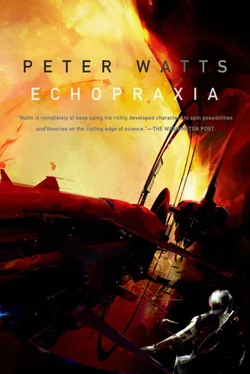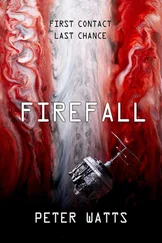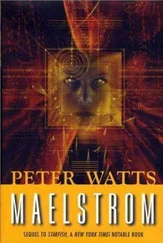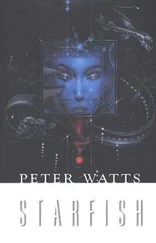“I do,” the voice said solemnly.
“They expected forty-four deaths. They planned it. They wanted it.”
“They didn’t want —”
“And when they brought that—that monster along for the ride, they knew exactly what they were doing. They have it all under control.”
“Yes. They do.” There wasn’t the slightest hint of doubt in the voice.
Brüks took a breath, let it out again, reflected on the faint unexpected scent of growing things at the back of his throat.
“I get the sense that faith doesn’t come easily to you,” the voice said gently after a few moments. “But sometimes things are just, you know. God’s will.”
He opened his eyes. Lianna stared at him, kind and gentle and utterly delusional.
“Please don’t say that,” Brüks said.
“Why not?” She seemed genuinely puzzled.
“Because you can’t possibly believe—because it’s a fairy tale, and it’s been used to excuse way too much…”
“It’s not a fairy tale, Dan. I believe in a creative force beyond the physical realm. I believe it gave rise to all life. You can’t blame it for all the horrible shit that’s been done in its name.”
Faint tingling in his fingers. A tide of saliva rising at the back of his throat. His tongue seemed to swell in his mouth.
“Could you—I’d like to be alone, if you don’t mind,” he said softly.
Lianna blinked. “Uh… sure, I guess. You can ditch the mesh any time. I brought you a fresh jumpsuit, it’s over there on the pad. ConSensus is hooked in to the paint job if you need anything, just tap three times. The interface is pretty—”
I’m going to throw up, he thought. “Please,” he managed. “Just go .” And closed his eyes again, and clenched his teeth, and choked back the rising nausea until the sounds of her retreat faded away and all he could hear were the voices of machines and the roaring in his head.
He did not throw up. He drew his legs to his chest, and wrapped his arms around them, and held them tight against the sudden uncontrollable shaking of his body. He kept his eyes clenched against the new world, against this microcosmic prison into which he’d awakened: infested by freaks and hungry predators, an insignificant bubble spinning farther from home with each passing second. Earth was only a memory now, lost and receding in an infinite void; and yet Earth was right here in his head, inescapable, a desert garden strewn with twisted corpses.
Every one had Luckett’s face.
WE LEARN GEOLOGY THE MORNING AFTER THE EARTHQUAKE.
—RALPH WALDO EMERSON
EVENTUALLY THE PANICreceded. Eventually he had to come back.
He wasn’t sure how long he floated there. For the present he was content to take refuge in the darkness behind his own eyelids, in the hiss of ventilators and the soft beeping voices of medical monitors. Some kind of alarm chimed in the middle distance; it sounded five times and fell silent. A moment later the world lurched to the right and gentle pressure began to build against his shoulder blades, against his calves and heels. Up and down returned.
Brüks opened his eyes. The view hadn’t changed.
He sat up, turned, let this new gravity drop his legs over the side of the pallet (his vitals vanished from the bulkhead as he rose). He fought off a threat of dizziness from his inner ears, held his hand out in front of him, watched until it stopped shaking.
The exoskeleton vibrated ecstatically as he peeled it away, each strip snapping back to some elastic minimum as he set it free. They took body hair and skin cells with them, left denuded strips along his body. He left it trembling on the deck, a tangled ball of rubbery ligaments that shivered and twitched as if alive.
He found his way to a lav that peeked around a small mountain of in-flight luggage, raided the bulkhead food fabber on the way back. Sucking a squeezebulb full of electrolytes he peeled fresh folded clothing from the wall where Lianna had left it: a forest-green jumpsuit, preemptively custom-fabbed by some onboard printer. He wobbled precariously while pulling on the pants, but the pseudograv was weak and forgiving. Finally he was finished: clothed, upright, his batteries beginning to soak up charge from the nutrients in his gut. He folded the pallet back into its alcove. Its smart-painted underside bulged subtly from the wall, softly luminescent.
Tap three times, she’d said.
ConSensus bloomed at his touch, an impoverished interface for the augmentally impaired: Systems, Comm, Library. A little v3-D Crown of Thorns hovered to one side in an imaginary void. All waited to dance at his fingertips, but he took VOCAL INTERFACE AVAILABLE at its word and said, “Ship layout.”
The animation expanded smoothly into center stage, bristling with annotations. Engines and reactors and shielding swallowed at least three-quarters of the display: thrust cones, fusion reactors, the rippling toroidal contours of great rad-blocking magnetic fields. Shock absorbers and antiproton traps and great protective slabs of lithium hydride. Brüks had seen the tech thumbnailed for short attention spans on any number of popsci feeds. Antimatter microfusion , they called it. A nuclear pulse drive turbocharged with a judicious sprinkling of antiprotons. Give it a decent launch window and the Crown of Thorns could make it to Mars in a couple of weeks.
“What’s our heading?” he asked aloud. NAV UNAVAILABLE, ConSensus replied.
“What’s our location?” NAV UNAVAILABLE.
“What’s our destination, then?”
NAV UNAVAILABLE.
Huh.
The Crown ’s habitable reaches lay along a spine one hundred fifty meters long, a tube of alloy and atmosphere connecting bits of superstructure like beads on a nail. The Hub Valerie had dragged him through was two-thirds of the way from drive to prow. Its spokes were back in motion, sweeping through space in majestic counterpoint to the flywheel farther up. (Only the Hub’s aft hemisphere rotated, Brüks noticed. The other—COMMAND according to ConSensus, as if any modern space vessel required anything as quaint as a bridge in physical space—seemed fixed to the spine.)
“Focus habitat.”
The Crown redrew herself from the inside, engines and shielding neatly excised, nothing left but the hollows of the Crown ’s forward section turning bright and front and center. Annotated constellations twinkled in those spaces like fireflies in a luminous gut. A cluster of gray icons glowed aft in the HOLD (enormous now, in the absence of its substrate): CHODOROWSKA, K.; EULALI, S.; OFOEGBU, C. Eight or nine others. MOORE, J.—green—glowed in the hab called DORM. LUTTERODT, L. was in the Hub, next to SENGUPTA, R. The hab containing BRÜKS, D. showed up as MED/MAINTENANCE, no matter what the sign on the hatch said; GALLEY/COMMONS occupied the hab immediately clockwise, LAB the one counter. STORES/TRIM, where he’d suffered his rude awakening, balanced out the wheel. Evidently it had already been reattached; but yellow neon highlighted distal injuries where the spoke was still under repair.
The last hab didn’t come with a label. Six stars shone there, though: five gray, one green. Only the green carried an ID, and it didn’t follow the usual format.
VALERIE, was all it said.
Fifty meters farther forward—past the Hub, past some kind of attic full of plumbing and circuitry and airlocks, way up past the main sensor array at the very front of the ship—ConSensus had drawn a hemispherical nose assembly and called it PARASOL. It appeared to be packed away for the time being but a translucent overlay showed it unfurled, a great flattened cone wide enough for the whole ship to hide behind. Brüks had no idea what it was. Space-dust deflector, maybe. Heat radiator. Magic Bicameral Cloak of Invisibility.
Читать дальше








